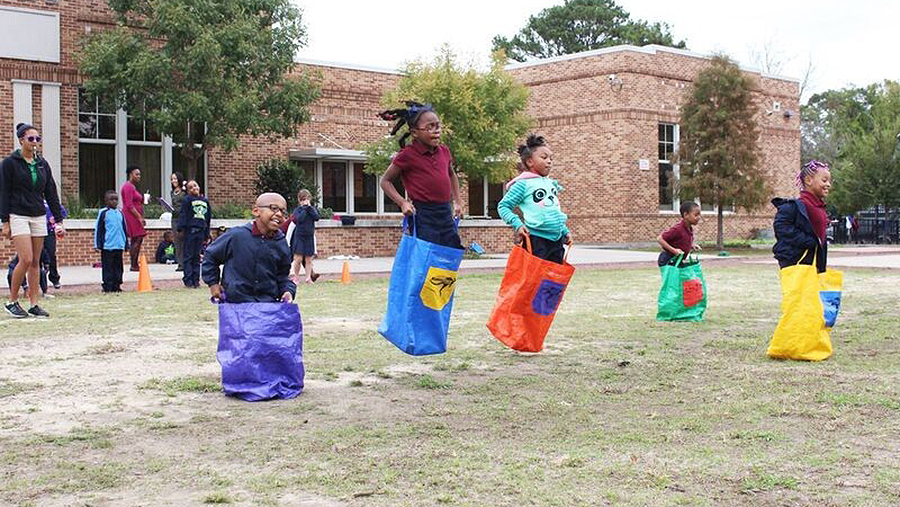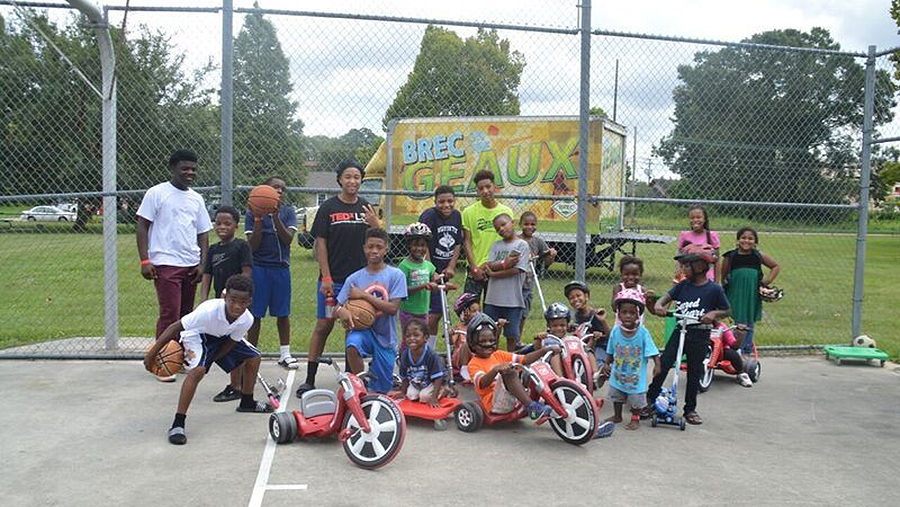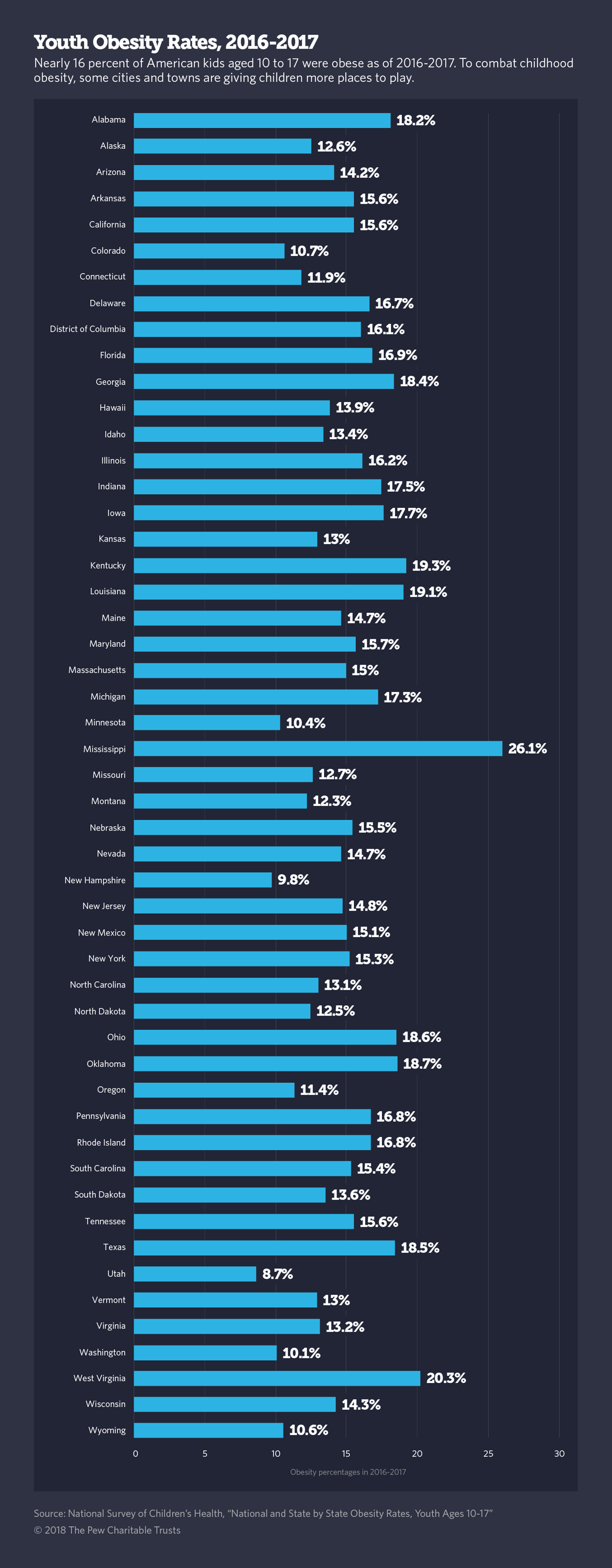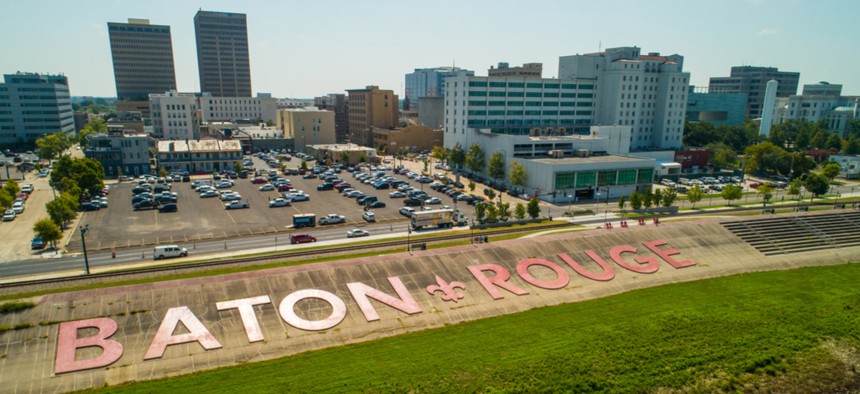Connecting state and local government leaders
Baton Rouge's parks agency wanted to get kids moving to combat youth obesity.
This article was originally published by Stateline, an initiative of The Pew Charitable Trusts.
In a state with the fourth-highest rate of youth obesity in the nation, the Baton Rouge, Louisiana, parks and recreation agency wanted to lure kids away from their screens and into the parks to get moving.
But the low-income youths who needed exercise the most weren’t showing up at the parks, because, officials learned, they didn’t have transportation, and their parents were too busy working to take them. So they decided to take the parks to the kids.
With money donated in 2012 by corporate sponsors and a portion of their parish budget, the local parks and recreation agency, known as the Baton Rouge East Commission, or BREC, bought a box delivery truck, painted it with bright colors and filled it with scooters, hula-hoops, balls, slack lines, trampolines, sidewalk chalk and jump ropes.
“The idea came to us one day while we were watching a bunch of kids turn flips on an old mattress someone had discarded near the office,” said Diane Drake, who directs BREC’s playground on wheels. “We realized it wouldn’t take much to get kids moving if we put it right in front of them.”

Naming the mobile playground BREC on the Geaux (a reference to the LSU Tigers chant, “Geaux Tigers!”), the parks and recreation agency in 2013 started what would become a daily program by holding community events at housing complexes, churches, parks and schools in low-income neighborhoods.
If peals of laughter and swarms of activity are any indicator, BREC on the Geaux was an immediate success, Drake said. “Once word spread, children would come running out of their apartments as soon as we pulled into the parking lot. It was all we could do to unload the equipment before they grabbed it and ran off.”
A year after it began, BREC officials drove the mobile playground to Charlotte, North Carolina, to share their story with others at a 2014 meeting of the National Recreation and Park Association.
Since then, BREC has received dozens of emails and phone calls from other cities seeking advice on how to start a similar program, Drake said. Recreation officials in Knoxville, Tennessee, told Stateline in an interview that they plan to start a copy of BREC’s program next year.
Other imitators include Waynesville, North Carolina; Greenville, South Carolina; Mt. Pleasant, Michigan; and Alexandria, Louisiana.
Transporting the joy and the health benefits of play to kids in underserved neighborhoods isn’t a new idea. A concept called “Play Streets,” in which local volunteers work with police and health officials in urban neighborhoods to temporarily block traffic so kids can play, has been thriving for decades in places like London, Chicago, New York and San Francisco.
But the idea is only now starting to take root in small and medium-sized cities—and in a handful of rural towns—where it turns out that low-income children and adults are even more prone to obesity than in the nation’s urban centers, according to a June report from the U.S. Centers for Disease Control and Prevention.
Baton Rouge was not the first city to launch a mobile playground. “We stole the truck idea from Rochester, New York,” Drake said, having researched other cities after their initial idea. “But our concept was different because it was designed to combat obesity.”
Rochester’s “Recreation on the Move” program offers homework help, read-aloud programs, art and music, in addition to some sports and group games.
The oldest known mobile playground started in Sioux Falls, South Dakota, more than 70 years ago, and it’s still operating, Drake said. “They temporarily repurposed vehicles used to transport seniors one summer and the rest is history.”
In Winter Park, Florida, a decommissioned fire truck was converted to a playground on wheels in 2012. And in 1997, East Point, Georgia, started using an old police SWAT truck to take play equipment to a basketball park for kids whose parents couldn’t afford to send them to summer camp, Drake said.
Budget-Friendly
BREC started its mobile playground project with $110,000, half from the Blue Cross and Blue Shield of Louisiana Foundation and half from the parish budget.
That paid for the truck, play equipment and staff and sustained the project for two years, with funds left over. In the third year, the agency bought a second truck and hired more staff with new funding from Blue Cross and other donors.
A Play Streets project funded by the Robert Wood Johnson Foundation supported play events in four diverse low-income rural communities last summer—Warrenton, North Carolina; Talihina, Oklahoma; Oakland, Maryland; and Cameron, Texas—on a much smaller budget: $6,000 for a handful of community events.
Instead of shutting down a street, the communities held the events in parks, fields and other public spaces.
Working with a local health department, an agricultural extension service, a church and a tribal health center from the various towns, Robert Wood Johnson researchers found that the Play Streets concept could be cost-effectively adapted for rural communities, said Keshia Pollack Porter, a health policy professor at Johns Hopkins University who worked on the project.

In addition to providing needed community interaction as rural residents traveled to town centers for the events, bouncy houses and other inflatable play equipment inspired kids and some adults to get moving. Strapping pedometers on kids who volunteered, researchers showed that physical activity among participating children was higher during the three- to five-hour events than it otherwise would have been.
In Baton Rouge, Louisiana State University’s Pennington Biomedical Research Center found that similar events sponsored by BREC resulted in kids getting about 50 percent more physical activity, as measured in FitBit steps, compared with weekdays and weekends without Play Street events.
“Play Streets are not a magic bullet,” said Jamie Bussel, a pediatric health expert at the Robert Wood Johnson Foundation. But combined with food and nutrition initiatives, and institutionalized by communities, including schools, day care centers and recreation departments, they can go a long way to tamping the nation’s obesity epidemic, she said.
Play Deserts
Just this week, a report from a Department of Health and Human Services committee published in JAMA noted that 80 percent of U.S. adults and adolescents are not active enough, and recommended that children and adolescents aged 6 through 17 should do an hour or more of moderate-to-vigorous physical activity each day.
Nationwide, the childhood obesity rate was nearly 16 percent in 2016-2017, CDC data shows. And obese children are more likely to continue to be obese as adults, which puts them at a higher risk of developing heart disease, type 2 diabetes, cancer and other conditions.
In addition, children with obesity are at a higher risk of developing chronic health conditions such as asthma, diabetes, sleep apnea, and bone and joint problems. They’re also more likely to be bullied and have depression, low self-esteem or social isolation, CDC data shows.

States vary widely in the rate of obesity among youths ages 10 to 17, according to the most recent National Survey of Children’s Health. Eight of the 10 states with the highest rates are in the South. Nine of the 10 states with the lowest rates are in the Northeast and West.
Mississippi has the highest rate at 26 percent and Utah has the lowest rate at 9 percent. The obesity rate in Louisiana is 19 percent.
One of the causes attributed to increased obesity in poor urban neighborhoods is a lack of affordable fresh food, sometimes called a “food desert.” But researchers say that many food deserts are also play deserts, where low-income children lack safe, stimulating outdoor play spaces.
In many low-income neighborhoods, parks are plentiful but tend to be poorly maintained and lack amenities such as up-to-date play equipment. They also might be in areas that are unsafe for children to walk to on their own, said Johns Hopkins’ Porter.
The Elm Grove community in Baton Rouge is one of them, Drake said. That’s why BREC on the Geaux parks there once a week to set up shop. “You can see the kids peeking out of their windows and doors as we pull up,” she said. “When they see our truck, they start running.”
Dee Taylor calls herself the grandmother and great-grandmother of Elm Grove, a subsidized apartment complex in Baton Rouge. “We didn’t have much of anything for the kids on the grounds.
“They stayed in their apartments and watched too much TV or played video games all day in the summer,” she said. “It was the only thing they knew to do.”
“So, when I heard about BREC on the Geaux, I made a call and they came.” Taylor put up a notice about the mobile playground’s schedule in the window of her apartment and another one on the door of the building’s management office. She told everyone she knew.
“A child needs that kind of physical activity to grow up in a wholesome way,” she said. “The more we can give them, the better their lives will be.”
BREC’s two play trucks visit dozens of housing complexes, elementary schools and parks in Baton Rouge every week. They show up at community gatherings on the weekend. During the Louisiana floods of 2016, BREC’s trucks made the rounds at local shelters, giving children a much-needed daily play break.
BREC on the Geaux had more than 100,000 participants in 2016, adults and children. “We may have been the hardest-working mobile play unit in the business,” Drake said. But since then, BREC was short on funds and had to curtail its schedule slightly. Based on demand, the program should be expanding, Drake said.
At Elm Grove, Taylor said she and her children wish BREC on the Geaux could visit more often. But she said she knows other neighborhoods need it too.

NEXT STORY: Cities Scramble to Shelter Homeless as Bitter Cold Weather Sets In



